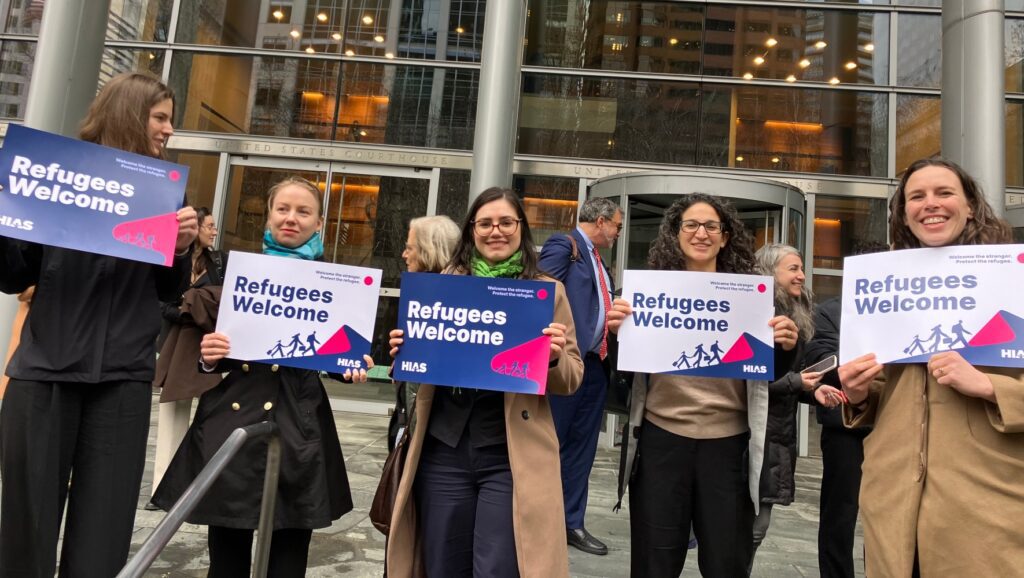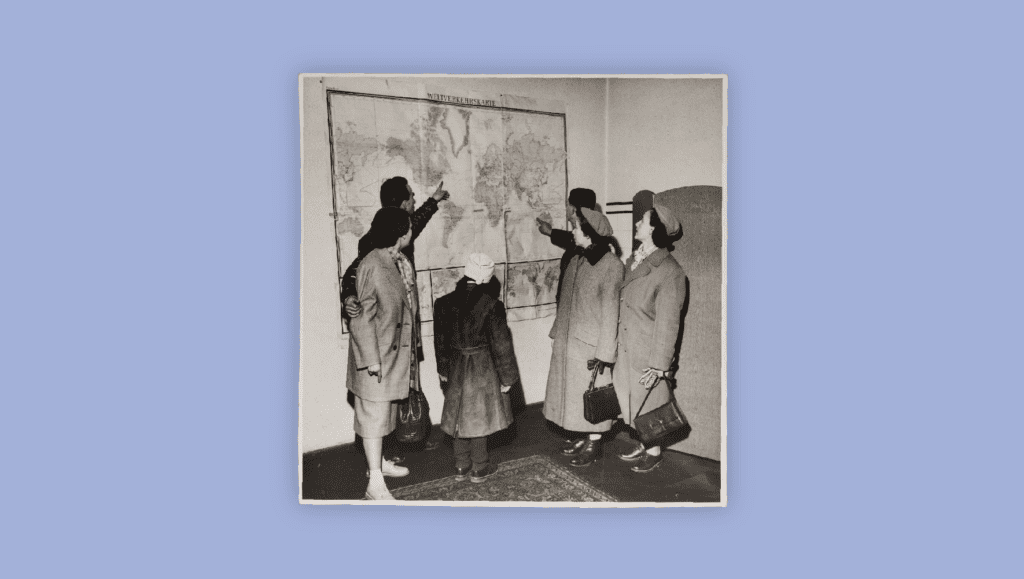
Since taking office, President Trump has issued hundreds of executive orders, memoranda, and proclamations, many of which pertain directly to immigration, asylum, and refugee resettlement. These actions, along with additional executive orders and legislation expected in the weeks and months ahead, are poised to reshape United States policy in a significant way.
In response, HIAS has launched a series summarizing important developments and explaining what they mean. These recap posts, along with relevant articles, statements, and resources, can be found at a page we’ve built to track the new administration’s effect on displaced people.
This week, we review how actions taken during Trump’s seventh week in office impact refugees and other displaced people.
President Trump Spreads Misinformation About Immigrants in Address to Congress
What happened: In an address to both chambers of Congress on March 4, President Trump made false, misleading, and exaggerated claims about immigrants and asylum-seekers in the United States. Among these statements, the president claimed that 21 million people poured into the United States during Biden’s presidency and that many of them were “murderers, human traffickers, gang-members and other criminals.”
What it means: Throughout the 2024 campaign, President Trump repeatedly and without evidence disparaged immigrants as an economic drain on the American economy and a threat to public safety. Upon taking office, he has used inflammatory and unsubstantiated rhetoric to issue sweeping executive orders to dismantle lawful pathways to immigration, including refugee resettlement, temporary protected status, humanitarian parole, and the right to seek asylum. These actions, many of which are currently challenged in court, have unleashed an extraordinary degree of harm.
Mayors Testify in Inflammatory House Congressional Hearing on “Sanctuary Cities”
What happened: On March 5, mayors from Boston, New York City, Denver, and Chicago appeared before the House Oversight Committee to discuss their cities’ “sanctuary” policies to protect immigrant communities. A member of the Committee accused the mayors of having “blood on their hands,” while another member threatened the mayors with criminal prosecution. In January, Rep. Nick LaLota (R-NY) introduced the No Bailout for Sanctuary Cities Act, which would deny federal funding to local jurisdictions that do not cooperate with the Trump administration’s mass deportation efforts.
What it means: Recent, substantive research shows “sanctuary” cities are safer, more economically vibrant, and in compliance with federal law. In her testimony, Boston Mayor Michelle Wu emphasized that Boston, where the crime rate has dropped 40% in the last two years, is the safest major city in the United States. According to Wu, “sanctuary” policies improve law enforcement by enhancing trust and communication between the police and immigrant communities.
Recent, substantive research shows “sanctuary” cities are safer, more economically vibrant, and in compliance with federal law.
Two Steps Forward in the Challenge to the Foreign Aid Freeze
What happened: The U.S. government has, to date, yet to fully comply with court orders to lift the foreign aid freeze. This week, there were two small steps forward. On March 6, Judge Amir Ali ordered the Trump administration to release foreign aid funds owed to the plaintiffs, including HIAS, in Global Health Council vs. Trump, a lawsuit that challenged the suspension of foreign aid and dismantling of the United States Agency for International Development (USAID). The day prior, the U.S. Supreme Court denied the administration’s challenge to an earlier deadline that they failed to meet.
What it means: The orders by Judge Ali and the U.S. Supreme Court mark positive developments in the ongoing effort to force the government to honor funding commitments for crucial, lifesaving humanitarian work. The State Department’s cessation of foreign aid spending has had a devastating effect on the lives of millions of people around the world, as well as the organizations who provide services for them. “We welcome the court’s ruling to hold the administration accountable for fulfilling its obligations, but we deeply regret that the administration has already caused irreversible damage by inflicting so much unnecessary pain on our staff and the refugees they serve,” said HIAS President Mark Hetfield.
Seattle Judge Responds to the Termination Letters Issued to Refugee Organizations
What happened: On March 4, there was an emergency status conference in Pacito v. Trump, the lawsuit challenging President Trump’s suspension of the U.S. Refugee Admissions Program (USRAP). The hearing addressed the termination notices received by refugee resettlement agencies on February 26, only one day after the court’s order that temporarily blocked the suspension of USRAP.
What it means: The termination notices mark an escalation in the administration’s attempt to curtail the processing and resettlement of refugees in the United States. The judge characterized the timing of the termination notices as a “remarkable coincidence” that raises “serious concerns,” indicating possible skepticism that the administration was acting in good faith. Despite these positive steps, the lives of refugees remain in a state of uncertainty, a situation with enormous and adverse humanitarian consequences.
We welcome the court's ruling to hold the administration accountable for fulfilling its obligations, but we deeply regret that the administration has already caused irreversible damage by inflicting so much unnecessary pain on our staff and the refugees they serve.Mark Hetfield, HIAS President
New Trump Travel Ban Could Target Foreign Nationals
What happened: Reuters reported on March 5 that the Trump administration will soon announce a “travel ban” that would broadly prohibit people from certain countries, like Afghanistan and Pakistan, from entering the United States. The ban, which echoes President Trump’s initial, first-term ban on travel to the United States from seven Muslim-majority countries, would affect tens of thousands of Afghan refugees and Special Immigrant Visa (SIV) holders who have already been cleared to enter the United States.
What it means: The administration’s decision to prohibit people from Muslim-majority countries would be a betrayal of the fundamental American values of religious tolerance. If enforced, the ban would leave tens of thousands of Afghans, many of whom honorably assisted the U.S. Armed Services, at grave risk of harm and reprisal by Afghanistan’s Taliban government. These individuals are extensively vetted and the denial of their entry to the country would undermine bipartisan efforts to enhance national security.
Trump to Revoke Temporary Legal Protections for Ukrainians
What happened: On March 6, Reuters reported that the Trump administration is planning to revoke temporary legal status for close to 240,000 Ukrainians who fled to the United States following Russia’s full-scale invasion, a decision that could fast-track their deportation from the country. The proposed revocation, which Press Secretary Karoline Leavitt labeled as “fake news”, follows a concerted effort by the administration to end lawful pathways to immigration and increase mass deportation.
What it means: If confirmed, the Trump administration’s decision to revoke temporary legal status and protection for Ukrainians would place hundreds of thousands of people at risk of return to an uncertain future in a war-torn country. Most egregiously, these were people who were invited and welcomed to this country: In 2022, Americans began sponsoring Ukrainian relatives and friends through a sponsorship program called United for Ukraine. The decision would erode the United States’ historic commitment to welcome refugees fleeing for safety and allow them to begin their lives again in a new country.



